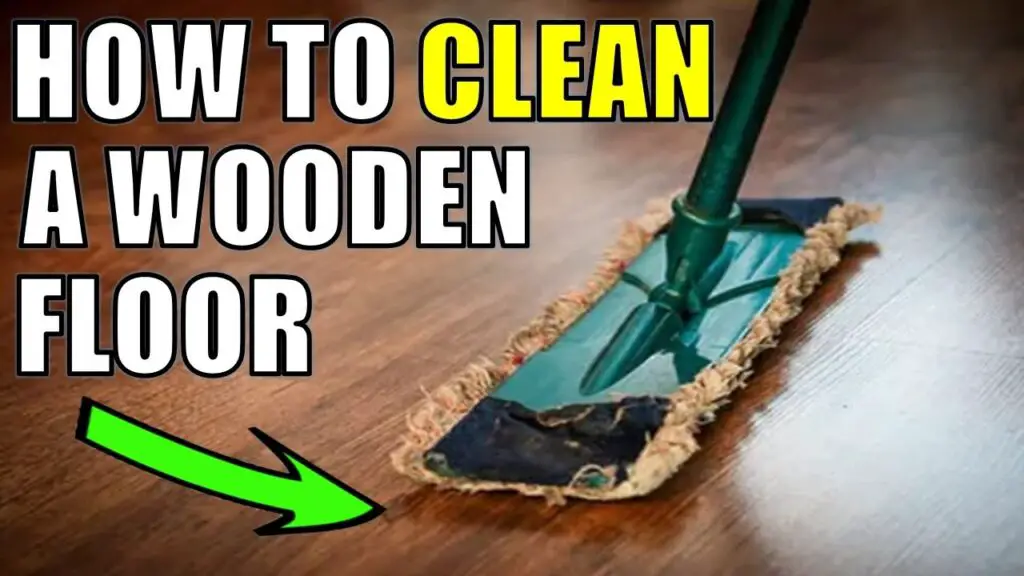Floors are the hardest working piece of furniture in your home. From scratches to spills to walking in dust and dirt from outside, floors suffer the highest amount of daily wear and tear. It's important to take good care of your flooring, especially if you have wooden floors.
Letting your wooden floors get too dirty can cause permanent damage which is costly to repair, refinish, or even replace. Stay tuned to learn how to clean hardwood floors naturally and why natural floor cleaners are safer and more cost-effective.
How Often Should You Clean Wooden Floors?
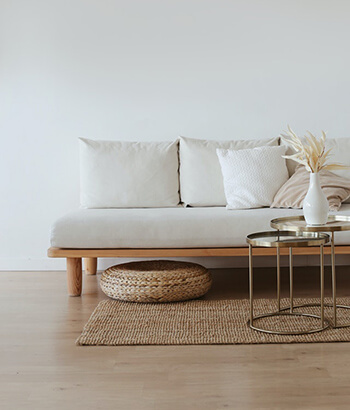
Follow these top tips for clean, shiny floors:
- Do a quick, routine cleaning of your floors a couple of times every week to avoid a buildup of dirt and grime. Vacuum cleaners and brooms can scratch wooden floors, so always use a microfiber mop.
- Once or twice a month (depending on how dirty your floors get), deep clean hardwood floors to buff them and really make them shine.
Why Choose Natural Cleaning Products?
The best way way to clean wooden floors is using natural remedies. Here's why.
More effective
A lot of commercial floor cleaners leave a residue on wooden floors, causing them to lose their shine. If your wooden floors look dull, it's most likely because your chemical wood floor cleaner has left a film on the wood. Try switching to a natural wood floor cleaner.
Biodegradable
Natural cleaning solutions are not only better for the environment, but they're better for your wood floor too. Chemical floor cleaners are packed full of harsh chemicals that damage the planet and the finish on your hardwood floors. They often come in non-biodegradable packaging and, if not disposed of correctly, can pollute local water sources. Natural cleaning methods use ingredients you already have in your kitchen, so there's less packaging and no damage to the environment.
Healthier
Chemical wood floor cleaners contain toxic chemicals that cause a wide range of health issues in humans and pets. The chemicals in floor cleaners can lead to respiratory problems, skin irritations, and other allergic reactions. As natural cleaning solutions don't contain toxic chemicals, they are safer for the whole family.
Cost-effective
Since most of the ingredients needed to make natural cleaning products are already in your kitchen cupboards, they are cheaper than buying commercial cleaning products.
How to Deep Clean Hardwood Floors with Vinegar: What You'll Need
Vinegar is one of the best ingredients to clean hardwood floors naturally. Not only is vinegar a natural product, but it brings out the shine on your wooden floors like no other. Read on for a few tips on the tools you'll need to get started.
Use the Right Kind of Vinegar
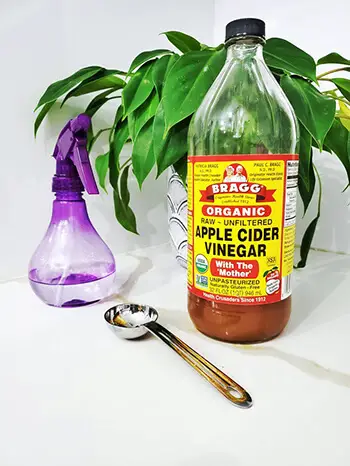
Opt for white vinegar or cleaning vinegar - it usually has a higher acid concentration than regular vinegar - for cleaning hardwood floors. If you don't have either on hand, you can also use apple cider vinegar. Never use red wine vinegar or balsamic vinegar to clean your hardwood floors.
Invest in the Right Kind of Mop
Choosing the right kind of dust mop is key. Microfiber mops are soft and won't scratch wooden floors. They are also perfect for getting into difficult-to-reach corners. If you don't have a microfiber dust mop on hand, use a soft-bristle broom.
Cleaning Wood Floors with Vinegar: A Step-by-Step Guide
Here's how to clean wooden floors with a natural vinegar cleaning solution.
1. Clear the Floor
The first step is to clear the floor by moving the furniture out of the way. To avoid scratching the hardwood floor when moving the furniture, invest in some furniture pads.
2. Get Rid of Dust and Debris
After you clear the floor and move the furniture out of the way, you should get rid of dust particles, dirt, and grime. Using a microfiber dust mop, gently remove any residue buildup on the wooden floors. If your floors are very dirty and you want to vacuum them, check the underside of the vacuum cleaner to make sure there isn't any debris that could scratch your floors.
3. Fill a Mop Bucket with Natural Vinegar Solution
Fill a mop bucket with a gallon of hot water and one cup of white vinegar and mix together. Your vinegar floor cleaner is ready to use.
4. Mop in an "S" Motion
Now it's time to mop. The technique is important when mopping hardwood floors. Start by dipping your dust mop into the vinegar mixture and giving it a thorough squeeze to remove excess water. The microfiber mop should be damp, never soaking wet. Now move the mop in an "S" shape, leading with the same side each time to avoid spreading dirt around. Change the solution when it becomes dirty for optimal cleaning power.
5. Polish or Wax the Floors
If you really want to make your floors shine, finish with a homemade wood floor polish. Here's how to make a natural floor polish to make your wooden floors sparkle.
Ingredients:
- 2 tablespoons of olive oil
- 1 tablespoon of distilled white vinegar
- 15 drops of your favorite essential oil (optional)
- 2 cups of warm water
Method:
- Add 2 tablespoons of olive oil to a clean spray bottle
- Add 1 tablespoon of white vinegar
- Add 15 drops of essential oil such as lemongrass, orange, or lemon to add fragrance
- Mix in 2 cups of warm water
- Shake well before each use
Once your wood floors are clean and dry, simply spray the homemade floor polish on the floor in small sections and buff it in with a microfiber cloth or mop.
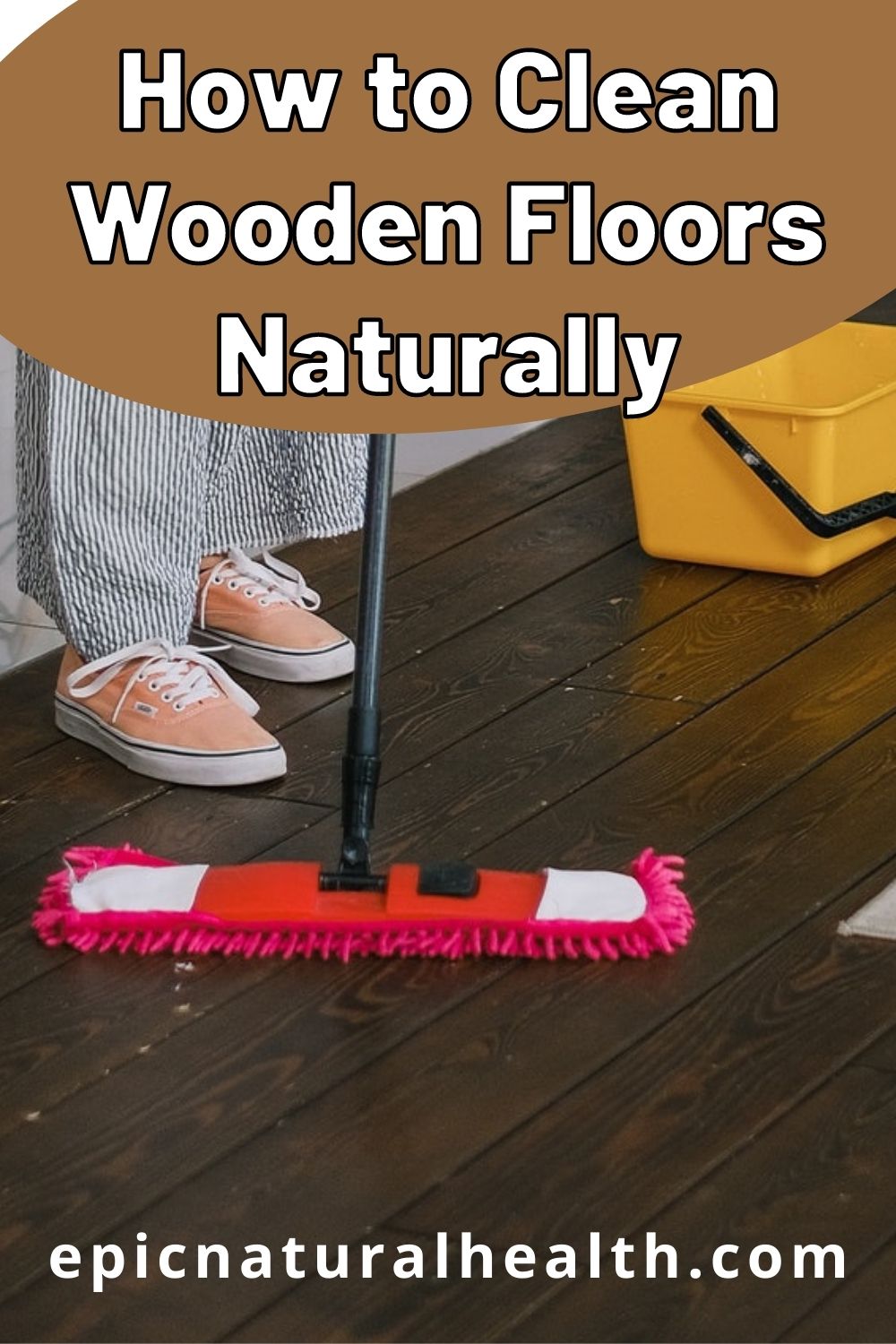
Natural Alternatives to Vinegar
Vinegar isn't the only natural cleaning solution for cleaning hardwood floors. If you don't have vinegar on hand, check out the natural vinegar alternatives below.
1. Castile Soap
Castile soap, such as Dr. Bronner's, is a great, natural alternative to vinegar. Castile soap is multi-purpose. It can be used as soap, laundry detergent, and a surface cleaner. It also comes in a range of scents.
To clean hardwood floors, add 1/8 to 1/4 cup of Castile soap to a bucket of hot water and mop as usual. It's best not to use Castile soap on waxed floors as it can damage the wax finish over time.
2. Lemon Juice Mixed with Olive Oil and Water
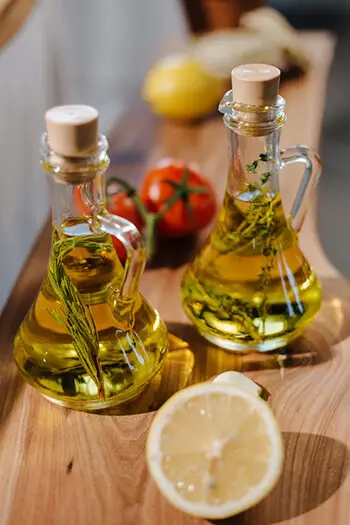
Thanks to its great smell and disinfectant properties, lemon juice is a popular natural cleaner. When mixed with olive oil, lemon juice can make your wooden floors gleam.
To use lemon juice to deep clean hardwood floors, try making this homemade solution:
Mix a 1/4 cup of olive oil (or vegetable oil) with a 1/3 cup white vinegar
Add five cups of hot water
Add a couple of teaspoons of lemon juice
If you want to skip the vinegar altogether, use baking soda instead. Simply make a paste with warm water, two to three cups of baking soda, and a cup of liquid dish soap. Rub the paste on the hardwood floors and leave it to stand for at least 10 minutes. Next, soak a microfiber cloth in lemon juice and use it to wipe down the floors.
Over time, lemon juice can bleach hardwood floors and damage certain hardwood floor finishes. So, it's best not to use this solution in your routine cleaning. Instead, use it sparingly when you want to give your floors an extra bit of sparkle.
3. Black Tea
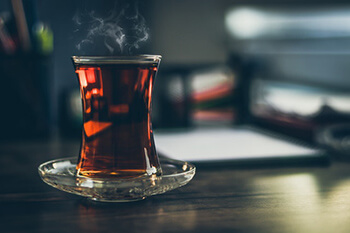
Black tea is a surprisingly effective natural floor cleaner. The tannic acid found in tea eliminates grime and adds shine to wood floors.
Here's how to make your own tea mixture:
Fill a bowl with 1.5 - 2 liters of boiling water
Add teabags (anywhere between 3 and 10, depending on the surface area you wish to clean)
Brew the tea for 10 minutes
Mop your wooden floors using a microfiber dust mop or soft cloth and the tea mixture
Wring your mop well to avoid excess liquid, which can cause water spots
4. Damp mopping
Even natural cleaning solutions can damage the finish of your hardwood floor over time. To maintain your floors and prevent unnecessary damage, alternate cleaning your floors with natural solutions and giving them a quick clean by damp mopping.
You'll need to use homemade cleaning agents –such as vinegar, baking soda, or lemon juice– for proper deep cleaning, but if you just want to give your floors a quick clean and shine, damp mopping is the most gentle option you can use.
Here's how to damp mop your wooden floors:
Fill a mop bucket with hot water (don't add soap or any other cleaning solutions)
Dip your mop in
Wring your mop out thoroughly (make sure you get rid of all excess water)
Mop your floor in an "S' motion using the damp mop
Top Tips for Maintaining Wooden Floors
Cleaning only does so much. If you want to maintain your wooden floors and avoid scratches, stains, or damage to the finish, these tips should help you out.
Scratches
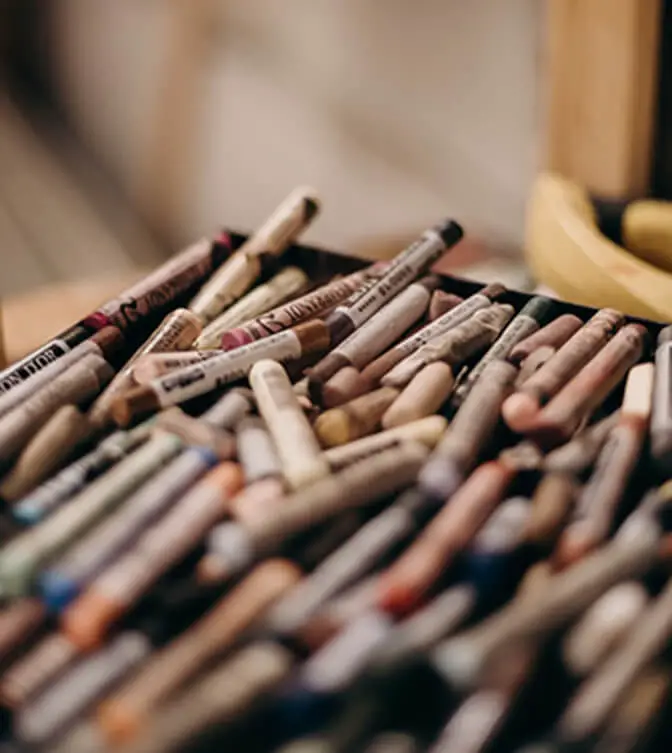
If your hardwood floor is scratched, no amount of cleaning will help. However, the crayon trick can be effective in concealing scratches:
Find a crayon in a color that matches the color of the wood as closely as possible
Press the crayon into the scratch, applying pressure to make sure that the scratch is filled with the broken crayon
Use a hairdryer to heat the crayon so that it melts into the scratched area
Buff the area with a damp microfiber cloth
Water Spots
Water spots are one of the most common problems you'll have with wooden floors. You'll usually find two types of water spots; dark water sports that have penetrated the wood, and white water spots that have only stained the surface of the wood.
To remove dark watermarks, start by using sandpaper on the stained area. Next, work steel wool over the affected area and finish with varnish or lacquer.
To remove light water stains, rub the stain with a soft cloth dipped in mineral oil. The mineral oil should lighten the stain overnight without the need to refinish the wooden floor.
Stains
You can remove stains from hardwood flooring using a mixture of water, white vinegar, liquid soap, and baking soda. Here's the process to follow:
Mix one cup of water with one cup of liquid soap
Add two cups of baking soda
Add a splash of white vinegar
Apply the mixture to the stained area using a soft sponge or microfiber cloth
If you make too much of the mixture, don't throw it away! It's perfect for unblocking sinks and getting rid of stains on other household surfaces.
Final Thoughts
Natural remedies are a great way to clean wood floors safely. Not only are homemade cleaning solutions made from natural ingredients cheap and effective, but they're better for our health and the health of the planet.
Harsh chemicals found in commercial floor cleaners are toxic to humans, pets, and local water sources. It's unsurprising that natural alternatives are becoming increasingly popular in homes across the globe.

